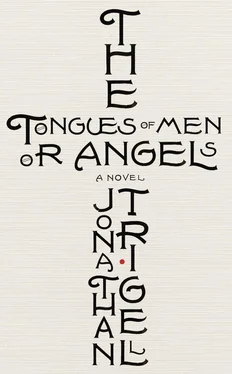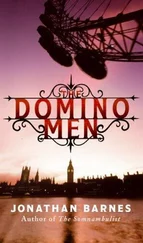Past the porticoes, the party enters into the great bazaar of the first court, filled with bleating beasts and sweating traders, crying repeated words about their wares so fast and so frequently that they become almost an unintelligible stream, like speaking in tongues. Money-changers and pedlars ply and, occasionally, priests glide by amid the pilgrims and peasant farmers carrying reed-tied sheaves of wheat as offerings. And Paul sees also the short grey tunics of Temple Guards, a uniform he knows well.
Paul is beyond certain that the world has altered utterly — the Christ’s sacrifice and Paul’s revelations have transformed everything — and yet to be here, you could almost believe that it all remained the same.
There is still the waist-high wall, which separates this area from the holier courtyards of the Mount and the Temple itself. The decorative palisade has many unguarded entrances — it is purely symbolic, easily crossed — but the fate of transgressors is made clear by numerous notices in every language: No Gentile is to enter beyond the balustrade into the forecourt around the Sanctuary. Whoever is caught will have himself to blame for his subsequent death .
So Paul cannot take his formation of followers with him as he passes through with the four Nazirites; only Timothy accompanies him. The others wait outside, as instructed, as close to Paul as the wall allows, alert for his return. A large group, but not so incongruous in this vast open courtyard, filled with strangers and wayfarers drawn from every cranny country of the earth.

But as Paul passes back through the barrier to rejoin his companions, there is a man he identifies, hazily, as at the frayed edge of a dream; a man from Asia, from Ephesus. Is he a follower of The Way or just a Jew from Ephesus? Paul can’t remember.
But the man clearly remembers Paul, because he shouts in anger, ‘Men of Israel, help! This is the fellow who preaches everywhere against our people, the Law of Moses, and this edifice. More than that: see how he has just brought a Gentile into the inner Temple and desecrated this Holy Place.’
Does the man think Timothy is a Gentile, then? It is true that he is half-blooded and looks none too much Judaean. Or does the man recognize Trophimus the Ephesian and assume that Paul had taken him, too, into the Temple? Or, worst of all, was this always a trap?
The four followers of James walk discreetly backwards from the fracas, returning to the sanctuary of the central courts.
Paul yells that he has committed no crime, that Timothy is a circumcised Jew.
But a crowd has formed; a ring of ruffians has organically appeared. Men who were seemingly dispersed in every direction, seeped into the corners, strolling, admiring the frescos, taking the shade of colonnades or half-heartedly haggling with stallholders, are suddenly gathered here. In cases where the likelihood of detection is so slight, the sanction must be heavy, or else where is the deterrent? For the warning signs to work, it must be known that the throng will enforce the toll. Judaea is a vendetta land under vendetta law. An eye should be gouged out for an eye lost. And this dreg riff-raff — suspiciously swift to emerge — seem extremely keen on gouging. Were they in wait for Paul, or do they always hope for the chance to commit murder countenanced by God?
Someone in the crowd shouts, ‘Kill him!’ And assailants tear into Paul. He is pummelled by fists. Knocked to the paving. The sky above him is dimmed by snarling shapes. Sandals stamp on his head. But Silas claws men from his master, swinging like a granite hammer. And Timothy jumps onto the back of one of the attackers and rends at his eyes. Mnason flees, but the two score of Paul’s other supporters charge into the mass of aggressors and what was a brutal assault on one man becomes a swirling skirmish on the forecourt of the Temple. Though outnumbered, Paul’s followers have advantage in knowing each other instantly, while the chaotic mass of their attackers faces confusion as well as pugilism. The violence is stilted and gusting — men grapple and are wrenched apart again. The battle is a vortex; centripetal Paul sucks in defence and aggression, many men fathoming who to fight in the brawling whirlpool only by how other combatants behave when close to the apostle.
Then Secundus, wrestling away an adversary who tries to strike his master, is knifed from behind in the small of his back and shrieks out at the pain as a sickle-shaped dagger is withdrawn. He drops to his knees, seeming puzzled, as if he feels an overwhelming urge to sit down and think about something, but he will not need to dwell on it for long. The assassin who struck the blow looks calm and satisfied. If he is angry, it is fury born of some slow-boiling hatred; he is not carried away in the heat of events.
But for a moment it is as if the fight has paused, while those nearby take in this escalation. And all who have seen, and are able, then draw their own blades and the pace of combat slows as the ripple of drawn daggers spreads and consequences climb. And the two sides disentangle and separate, backing away from knife slashes. Some of the fallen are dragged from the ground into their own lines.
Paul and his disciples are encircled by a force of greater and growing numbers. The apostle’s followers gather around their master and the injured Secundus; silent Secundus, robe rooster-comb red, face translucent as a stilled bird-chick. And though the crowd hesitates to rush at the opposing knives, they begin to lob objects and feint lunges, as the bravery of superior numbers is bolstered. There is no way for the apostle’s men to escape; it is stark clear how this will finish. The only remaining doubt is how long it will be before they are overborne and butchered. They will bleed out on the forecourt, like so many beasts. Because sacrilege demands sacrifice. There is no atonement without the shedding of blood.
But then, as a division of deus ex machina , a formation of Roman spearmen comes running, Mnason at their head, leading the cohort to the battleground. Mnason had a message to deliver in case of trouble and he has conveyed it, compelling as an angel. Legionary boots troop across the Temple court and the crowd must burn with the urge to pelt them or charge them, but to do so would mean death. The mob’s blood is up, but they still hold on to the greasy edge of reason sufficiently not to challenge the trained killers of Rome. Not just yet.
The soldiers come to a practised stop with javelin points like a stockade buttress between the two factions. And the tribune of the cohort draws Paul from the mass of his followers and demands of him: ‘Is it true what this man Mnason says, that you are a Roman citizen?’
And Paul, whose face is raw-bruised, who bleeds from his nose and his lip and one ear, laughing with fear-rush and relief, replies, ‘I am. And, praise God, it was worth every drachma.’
Forty-nine Years after the Crucifixion
Drusilla can feel a headache coming on. At least, let it be only that … For sickness is no respecter of wealth or station: the mal aria — the bad-air fever that comes with the muggy summer humidity — robs from palace and shack alike, and even here at the seaside one is not completely immune. Life is a near-death experience. If you get ill, one of two things happens: you get better or you die. Physicians can do little more than predict which of those it will be and charge for whatever quackery they prescribe, if they think you might survive. Only dreamers really believe that healers cure disease. In this world a tiny incision can cost a limb or a life in gangrenous creep. Or lock your jaw, spasms spreading, muscles seizing and arching in orgasmic parody until ceased by suffocation. Or that small cut can become a funnel to ease into the body a plethora of amorphous pestilences — small wonder that men so shy from circumcision — but there are any number of ways to die. Ways beyond counting. Life is hard and death is easy. That is to say, for most people life is hard. For Drusilla, that has rarely strictly been the case.
Читать дальше













